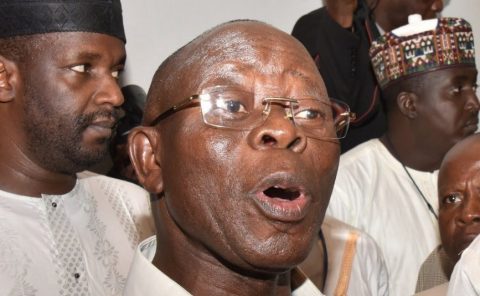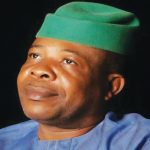OPINION: Adams Oshiomhole’s Tirade, By Adewale Kupoluyi
Articles/Opinion, Featured, Featured Contributors/Columnists, Latest Headlines Friday, February 21st, 2020
(AFRICAN EXAMINER) – Following the Supreme Court ruling over the Bayelsa State gubernatorial election, the National Chairman of the All Progressives Congress (APC), Mr. Adams Oshiomhole, has pontificated that nobody should be sworn in as the new governor of Bayelsa State.
Oshiomhole made this known after the apex court sacked Mr. David Lyon of the APC as the governor-elect of the state and called on the Independent National Electoral Commission (INEC), to declare the candidate of the party with the next highest number of votes with the required constitutional spread as winner.
The APC Chairman claimed that only his party’s candidate met the desired spread, as expressed by the Supreme Court and that the PDP candidate does not have the one-quarter of the total lawful votes cast in the election in two-thirds of the eight local government areas in the state.
Just for emphasis, Mr. Duoye Diri of the People’s Democratic Party (PDP) had come second with 143,172 votes while Lyon garnered 352,552 votes. Lyon had won in six out of the eight local government areas in the state while Diri won in only two. However, the constitutional requirement for the winner of a governorship election is to have the highest number of lawful votes by securing 25 per cent of votes in two-thirds of the local governments in a state. Furthermore, his removal was based on the identified inconsistency in the name of his deputy, Biobarakuma Degi-Eremienyo in the certificates he submitted to INEC.
The APC Chairman’s statement has elicited mixed reactions from a cross-section of Nigerians including the main opposition party; the PDP, which described Oshiomhole threats as “inconsequential ranting.” The party in a statement by its national spokesperson, Mr. Kola Ologbondiyan, cautioned the APC national chairman to desist from determining what happened to Bayelsa, saying the people of Bayelsa State know that the INEC, under the laws, cannot take instructions from any individual, let alone what it called a factional national chairman of a dysfunctional political party like the APC. The ruling party disclosed that it had further written to INEC and demanded for a fresh governorship election. Mr. Yekini Nabena, who is the party’s Deputy National Publicity Secretary, said that Oshiomhole had made the request in a letter to the INEC Chairman.
Few issues have arisen from the APC Chairman’s comments. First, was the party chairman doing a judicial review in the course of challenging the decision of the court? Or, was he simply talking from the lens of what his party wants to see happening in the next dispensation? Whichever way may be the permutation, the problem with our politicians remains the same.
Rather than honestly look at matters from a national perspective, what appears paramount to them is what benefit accrues to their party. The song would have been the other way round had it been that the judgment was given in favour of the ruling party like what played out in the Imo State verdict. The inflammatory statements by party leaders are capable of unduly questioning the integrity and credibility of the judicial arm of government.
Curiously, after the declaration of APC candidate winner of the Imo State election by the Supreme Court, the same Oshiomhole had argued that the APC deserves the judgment based on the ‘facts’ available to the court and INEC. He accused the PDP of recklessness and attempt to cause violence among Nigerians following the court decision.
He alleged that the PDP connived with INEC and the judiciary, while it was in power, to circumvent electoral processes and judgments during and after the 2003 and 2007 general elections and went on to caution the PDP against the use of inciting words. He urged the party to embrace defeat as the APC did when the court sacked its elected members in Sokoto, Zamfara and prevented the party from contesting in the last Rivers State governorship polls.
In another show of shame and assault on the judiciary, protesters recently thronged the front of the Abuja and Port Harcourt residences of Justice Mary Odili, following the judgment of the Supreme Court, which sacked the APC candidate in Bayelsa State, as some people had gone to the houses to protest the verdict.
The attacks on her person and character as well as the invasion of her privacy because of a judgment delivered by a panel she headed in the normal course of her work are unfair. The attacks on her character and premises are certainly not the way to go because of a perceived ‘unfavourable’ judgment given by respected judges. The right to freedom of expression by the protesters should have been exercised within the ambit of the law of the land.
As a matter of urgency, political parties and INEC should begin to educate and orientate politicians and party faithfuls on how to manage electoral failures and success. Most cases of electoral violence in Nigeria can be traced to avoidable anger displayed by the losing political parties at both the state and federal levels. Even winning parties often go on the rampage to attack opponents with a sort of we-are-now-in-power disposition. When we get it right on how to manage our electoral successes and failures better, then the political climate is likely to witness more stability than what is obtainable.
What the APC Chairman should have done was to congratulate the PDP candidate on the victory while exploring the next line of action without heating up the polity. Such disposition would not only calm down frayed nerves, it would promote democratic consolidation. Due to the tension-soaked nature of our politics, we tend to forget so easily that the judicial process is very thorough, diligent and rigorous.
The fact that politicians expect certain line of judgment and when the contrary happens should not be at the detriment of the sacred courts. Administration of justice should be insulated from political interference, vituperations and uncouth speeches by politicians. Not too long ago, security agents raided the homes of judges while lawyers are attacked for performing their lawful duties. Democracy that we practice allows for all manners of freedom as permissible under the law. The judiciary and judicial institution should always be protected and respected.
Kupoluyi writes from the Federal University of Agriculture, Abeokuta (FUNAAB), adewalekupoluyi@yahoo.co.uk,@AdewaleKupoluyi
Related Posts
Short URL: https://www.africanexaminer.com/?p=50775






















